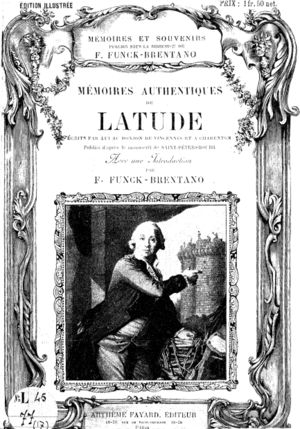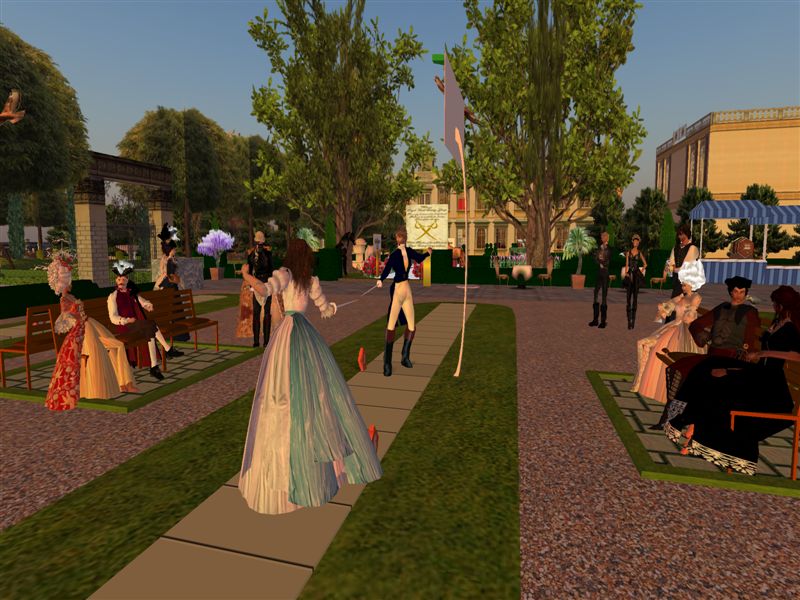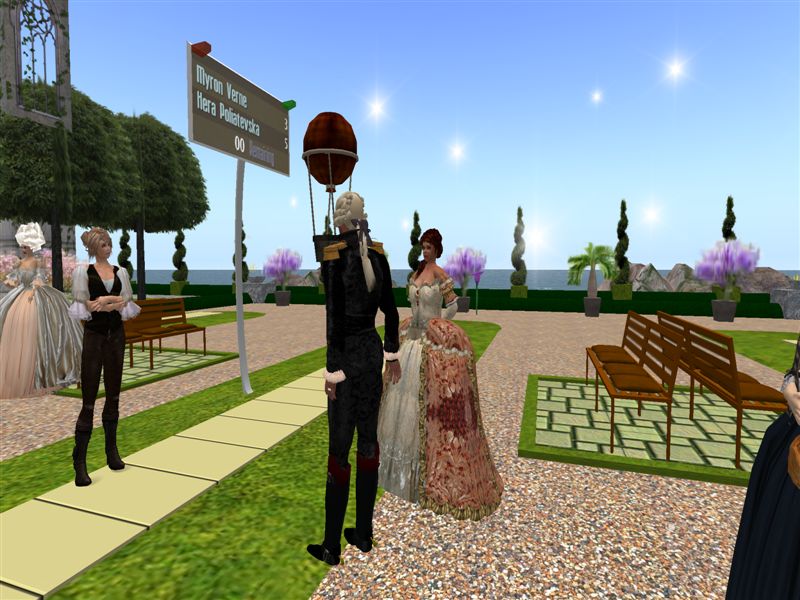Footnote to the Story of Latude: the "Lettres de Cachet" or Sovereign's Sealed Letters
By Lord Myron de Verne, 2010-10-20

France was ruled in 18 th century by an absolute Monarchy: it means all powers ( including the judicial power) were united in the hands of the King, who held them by a decree of the Divine Providence: it therefore could not be discussed, disputed or contested.
Of course, the king could not rule alone a country of 30 million inhabitants: so, for instance in the judicial field, he delegated his power to Parliaments ( which were not Parliaments according to our present day meaning, but Courts of Justice), the big one in Paris, and several others in different regions).
So there were, in French law, two kinds of Justice, the Justice Dlgue( Justice delegated to the Parliaments), and the Justice Retenue ( Withheld Justice) : the latter term meaning the King could in many circumstances decide not to delegate his judicial power to the Parliament, but to exercise it himself directly.
The usual legal tool for this Withheld Justice was the Lettre de Cachet. It was a sealed letter, signed by the King, giving an order, mainly to jail someone. The letter was the sentence and its order of execution, and the royal sentence, being final, needed no motives nor explanation.
They were of two sorts : les Lettres de Grand Cachet, and les Lettres de Petit Cachet.
-Les lettres de Grand Cachet : These were decisions of the King himself, by his own will. It concerned mostly political issues, as in the case of Voltaire and Diderot, who were jailed in La Bastille. It could also concern some lesser characters, when the king thought a public trial by the Parliament could be a nuisance to himself or his relatives, or favorites, or cause a scandal in the Court. They were also a mean of avoiding to have a case judged by the Parliaments, which were often in conflict with the King, and could sentence differently than the King would have wanted them to. (Latude was a typical example of this use of the Sovereign's Sealed Letters).
-les Lettres de Petit Cachet: By far, the most frequent use of the Lettres de Cachet, they were signed by the King at the request of individuals: they could not concern crimes, but only lesser offences.
They were most of the time requested for private affairs, by Nobles or Rich plaintiffs, who intended to protect their family name from a public scandal.
5 categories of offences could lead to a Lettre de Petit Cachet:
-Madness or Irresponsible behavior
-Excess of Youth
-Libertinism
-Unbalanced Marriage( mostly between nobles and the people)
-more serious offences.
The consequences were:
-Unlimited detention in case of madness or insanity
-One or two years in jail in case of libertinism or debauchery,etc
- More important sentences for violent offences, or offences who would have dishonored the Families if a Court had judged them.
To ask for a Lettre de petit Cachet, the process was as followed: A family or individual would file a request at the Bureau des Placets, opened daily in Paris. In case of a public scandal, the request may be filed by the local priest , or bishop, or Landlord. Then an investigation is led by the Police, checking two main points: are the facts mentioned in the request real and true? Can the applicant, family or individual, pay for the expenses of the jail?( when one asked for a Lettre de petit cachet, one had to pay for the prison expenses for all the duration of detention). In case of a Lettre de Grand Cachet, the Royal Treasure paid for the State Prisoners expenses.
( for instance, Latude had the status of a prisoner of State, having been jailed by a Lettre de Grand Cachet, and all expenses were paid by the Royal Treasure. On the other hand, examples of prisoners by Lettres de Petit Cachet were the Comte de Mirabeau, jailed in Jura because he was about to ruin himself and his family with debts and libertinism, and Marquis de Sade well, in this case, you know whytheir families paid for the prison costs).
Even if it was statistically marginal, this practice of Lettres de Cachet was immensely unpopular by the end of 18 th century: The Philosophers had compared the Law in England and France on this matter, and claimed for the adoption of the British HABEAS CORPUS in French Law ; the King never accepted to abdicate this power of his. This showed two conceptions of Sovereignty and Law ,too far apart to compromise, and announced the revolutionary clash.
( the illustration on top of this footnote is a "Lettre de cachet" signed by Louis XV)

He is known ( a little) in History as LATUDE, but was born Jean HENRY ( such a common name !) in 1725, in the small village of Montagnac in Languedoc, from an unknown father.
His mother belonged to the small provincial Bourgoisie, and raised him alone, trying to provide this young, ardent, imaginative, presumptuous and undisciplined child with the best possible education, but her best was not enough.
At age 17, he enrolls as a Garon Chirurgien ( Surgeon Assistant) in the French Army, when the War of Austrian Succession storms all over Europe. He shaves beards and pulls teeth between the battles, and after victories or defeats, holds the wounded during amputations, or carries the dead to the common grave. He dreamt of a glorious or at least enviable destiny, and this one is certainly not compliant with his chimera.
When the war is over, he resigns, and his relentless ambition calls him to Paris , the center of the world, and the City of all opportunities: he changes his name for the first time, in Jean Danry, and is flabbergasted by the hectic life of the French Capital, and by the Parisiennes. His hopes for opportunities to earn a fortune without working are disappointed though, and the spare money he kept from his Army years soon runs short. He has to find an idea soon.
At the same time, the rumor spreads through Versailles and Paris of a great conflict between Madame de Pompadour, Louis XV s favorite, and the Comte de Maurepas, Minister of State, and Chancellor of the Royal Treasure. Madame de Pompadour convinces the king to dismiss Monsieur de Maurepas, and it causes an uproar at the Royal Court.
Jean Henry or Danrys time has come: he gets the idea of having a parcel delivered to la Marquise de Pompadour, and this gift contains a bomb of his own making. A miserable, inefficient bomb, but actually his idea is to warn the Versailles Security before the parcel reaches the Marquise, and therefore to attract attention on himself, and appear as the savior of the Favorite. He hopes a reward, and who knows? a pension, or a place in Versailles.
But things turn otherwise: he is suspected ( the Security had him writing down his testimony of the facts , and his handwriting is very much the same as the one on the parcel), the Pompadour harasses the King to discover who plotted against her behind the scenes, the opposing party rages against the PompadourThe King senses that if he lets the Parliament ( name of the Court of Justice) deal with this affair, as ordinarily he should, the scandal will go on and on, and grow up and up: he decides to sign a lettre de cachet, which is an order to lock Danry in the State Prison of La Bastille, at the eastern border of Paris, without any trial . This is much more discreet! We are in 1749, Danry is 24 years old.
He is set on the grill ( metaphorically) there, by investigators, to reveal who are his sponsors and accomplices in this plot: of course, he says nothing, since theres nothing to say! Time passes, other plots or intrigues happen in Versailles, the interest in his case fades awayHe is transferred to another jail, the Dungeon of Vincennes: this prison is looser than la Bastille: he can walk in the yards, meet the other prisonersHe soon begins to court his jailers daughter, who brings back , every Sunday, the laundry of prisoners who can afford to have their linens washed and ironed.
They chat and flirt in the main courtyard of Vincennes, and the girls dog barks and plays around them.
Danry-Latude throws a twig to the dog, the dog brings it back; he throws it again further, and it hits a small door in the Prison wall: the dog rushes to this place, and catching the twigswings the door opened! It wasnt locked!
So Danry, quietly, without running, escapes and disappears in the streets.
A few days later, wandering at loss in the streets of Paris, he comes back in the Vincennes vicinity, and is caught. Back to Bastille!
This time he is more severely locked in, with another prisoner: soon, the two jailpartners manufacture a rope ladder, out of logs for their fireplace, and threads from sheets and clothes. After six years , it is ready, and they escape again! A sensation! it never had happen before in La Bastille!

( engraving of La Bastille Prison during the 18th century)
Danry-Latude crosses the border and takes refuge in the Netherlands: after six months, he is captured again, and sent back to La Bastille: this second escape aggravates his case, so he is thrown alone in an isolated jail, deeper, damper, and filthier than the former ones.
He lives there in the sole company of rats, and, sharing his daily food with them, tries to tame them, giving them first names, and pretending he is their new kingHe also begins to write letters to all the influent and mighty people of Versailles, Paris, Nobles, members of the Parliament, writers, religious dignitaries, intending to attract their attention on the unfair and desperate situation he has been unjustly thrown in. He flatters them most of the times, and sometimes, as no answer is coming, he threats. Irritated by the lack of reactions to his pleas, he writes more and more letters, giving advices on how the kingdom should be governed. He signs these letters Masers de Latude: its more chic! He will now be known as Latude.
After the death of Madame de Pompadour in 1764, he is transferred again in Vincennes, to alleviate his pains. There again, he can walk outside, even out the prison itself, on the strict condition to be accompanied by a guard. One day, as he walks side by side with his warden in the streets of Vincennes, a thick fog suddenly wraps them.What do you think of the weather?asks Latude.
-Methinks its bad says the soldier
-Methinks its good, answers Latude, - for an escape, at least! By-ye!.
Once free, he naively, stupidly or madly goes on writing letters here and there, asking for protection, demanding indemnities for his unjust imprisonment, detailing wondrous fanciful political projectsand of course is trapped again. Back to Vincennes.
In 1775, the Minister Malesherbes, visiting the state jails, meets Latude, and convinced the latter is plain insane, has him sent him to Charenton, an asylum. Two years after, he is released, but obliged to stay out of Paris. He doesnt, and is soon accused of extorsion, and sent first to the Jail of Le Chatelet, and next to the asylum of Bicetre. Latude gets sick, catching scurvy, but goes on writing letters, and his biography.

(Latude's escape rope ladder)
Finally, he is freed in 1784, having spent 35 years in jail WITHOUT ANY TRIAL, and having escaped six (or seven?) times. He then has his book, Despotism Unveiled, or the Memoirs of Henri Masers de Latude, jailed for 35 years in different State Prisons, published in 1787 in the Netherlands ( to avoid French censorship).
He suddenly becomes the talk of the town, the toast of the Enlightened, and the darling of Society Ladies: times have changed. The monarchy is exhausted , needs reforms which the undecided King is unable to promote against the opposing lobbies, the enlightened ideas are gaining the ground the absolute monarchy is yielding, and the word Revolution, blossoming on many lips, is not anymore taboo; besides, the overall mood of the day is clearly pre-romantic, and many Nobles and Bourgeois shed a tear on the ill fate of this poor victim of despotism. Some of them begin to sponsor Latude, for the first time in his life.
But the best , for him, is yet to come: on the 14 th of July 1789, the Bastille is assaulted by the people of Paris, its the starting day of the French Revolution. Latude goes there immediately, and grabs, before the Bastille is demolished, his escape ladder that had been kept there for 28 years(this same ladder can still be seen nowadays in the Paris History Museum, Muse Carnavalet).
In his old days he becomes a hero of the people, a legend, a symbol of the victims of false arrests and Royal Arbitrary: he is awarded a life-time pension by the Convention( political Parliament of the Revolution), and every Lady with a Salon definitely wants him at her Dinner Parties! Day after day, year after year, he is asked again and again to tell about his escapes, and oh my, does he like it!
The Duchesse dAbrants invites him one evening and writes in her Memoires : Lorsquil arriva, je fus au devant de lui avec un respect et un attendrissement vraiment difiants. Je le pris par la main, je le conduisis un fauteuil, je lui mis un coussin sous les pieds ; enfin, il aurait t mon grand-pre que je ne laurais pas mieux trait. A table, je le mis ma droite. But the charm soon dissipates , and she adds : Il ne parlait que de ses aventures, et avec une loquacit effrayante. To sum it up, he is a self assured bore.
He has his final escape, without return, on January, the first 1805. I like to imagine him on the threshold of Heaven, anxiously looking at St Peters bunch of keys, and wondering if Hes not one more jailer
Thus ends the story of an otherwise unremarkable fellow whose remarkable destiny illustrated one of the aspects of Justice in 18 th Century. If you are interested in more legal details , read the footnote to be published separately
.

(Donjeon de Vincennes, former Latude's prison)
 For months , I nurtured the idea of telling stories of lesser known French 18th Century characters and facts: I thought it could be a lively way to shed some light on everyday life in those days.
For months , I nurtured the idea of telling stories of lesser known French 18th Century characters and facts: I thought it could be a lively way to shed some light on everyday life in those days.
Alas, I had not realised what a time-consuming task it was: documenting, building a synopsis, and writing it in English, which is not so natural to me, as you'll soon discover ( please purists, accept my apologies!).
So I had nearly abandoned this too heavy project( I'm busy most of the time, and lazy for the rest...). Then I read here the excellent portrayals of Royal Court Personalities by Melle de Milneaux, and she gave me the start and courage to go back to my desk.
So let me dedicate this first story of a series to Marie- Therese de Milneaux.
The first story you will be able to read here very soon, will be titled:
"LATUDE, or 35 years in jail without a trial, and seven escapes"
It will be followed next month by the story of an even more fascinating character!
Thanks to the warm and caring welcome of His Majesty King William and Her Majesty Queen Wilhelmina of Orange Nassau, our first fencing tournament has been an enjoyable and exciting event!
But no thanks to the Highwaymen and Pirates who blocked some roads and harbours, preventing many to log in on time, or to log at all! What was the Linden Police doing?  )
)

The tournament took place in the elegant gardens of The Isle of Roy, with the background cries of seagulls and the majestuous flight of a falcon over us. Refreshements were available for fencers and spectators.
What a graceful setting! Everything was ready for the competition, on the three pistes!
In the first duel, Sir Trasgo Beaumont, the famous painter, took the lead; but her Majesty the Queen Wilhelmina(Susanah Tigerpaw), with her unremittable perseverance and consistent fencing,finally won the last points.
Captain Paco Gothly, a brilliant swordsman from the Court of Spain, defeated Dr Pekel Panacek, one of the champions of Le Duch de Coeur( no doubt Pekel missed the relentless encouragements of his Fiance... )
At the same time, Mademoiselle Hera Poliatevska was so upset and blushing: she never had met a King before! and we saw her so confused and sorry when she defeated His Majesty The King of the Netherlands ( Roy100 Allen), an excellent fencer himself! No, Hera, it was not a crime of lese-majesty:)

Finally, Tatiana, Duchesse de Provence, arrived later:She had been delayed by the unfortunate encounter of this gang of highwaymen, who prevented her to join us in time: she disbanded this mob, by herself alone, with the sole help of her sword ! (Well, so she said..). Was she tired and short of breath after these efforts? I eliminated her from the competition( though with difficulty): this Myron has no mercy !
The next round opposed Queen Wilhelmina-Susanah Tigerpaw, to Hera Poliatevska, and Captain Paco Gothly, supported by charming ladies from Spain, to myself: Both duels were long, fierce and so close...: in the end, Hera and Myron were qualified for the final duel, which was won rather easily by Mademoiselle Poliatevska, undoubtedly the best fencer of the day.

.
Hera was a young girl in the vicinity, who was always around and willing to attend our fencing trainings...I asked her one day, as a joke, if she would like to fence with us? She did, and it was not a joke anymore! I am so proud I recognized very early her gifts at fencing, helped her developping them, and became her Fencing Master. She may not be " une Noble Dame de Qualit" but she certainly is a woman of many noble qualities, including her skill with a sword. I take it as my duty to encourage talent wherever it comes from, Nobility or Tiers-Etat,, men or women...I lost the tournament yesterday, but nothing could have made me happier than to see my " disciple" surpassing her Master, as Hera did, and I was more proud than if I had won myself !
She received the prize of 1500 L$, so generously awarded by the Court of Orange Nassau to the winner, from the hands of the King himself, and under the kindly eyes of the Queen. Her heart must have been beating so fast then!

But this tournament would not have been half as enjoyable, if we had not been graced by a numerous and cheerful attendance:Her Excellency La Contessa Rezzonico, who speaks so many languages so well, Her Grace the Duchesse de Rochefort, who came all the way from Versailles and is a keen observer of this fencing game she masters perfectly,the newly-wed Baronesse de Coeur Maria Louisa and her husband Captain Fletch Kidd ( next time you HAVE to fence , dears),Madame de Tancarville, Ladies Oona Riaxik ( a future fencer?) and Summer Serendipity ( a fencing beginner) from Coeur,Senoras Sevilla Abbot and Marliz Lenroy from Spain, not to forget my sweet and beloved Lady Candace, who was so helpful with organisation and welcomed our friends...A jolly and refined company , Indeed !
After the tournament, some of the guests and the Royal Couple danced the evening away in the huge and prestigious Ballroom of The Court: a peaceful and charming ending for a perfect day !
We will have more fencing events in other Courts in the future, and we will come back to the Netherlands some day. Do not be impatient In the meantime,please join the Royal courts Fencing Group, and attend its meetings: it's a good way to entertain oneself, to practice adequate baroque roleplay,to meet old friends and make new acquaintance !
In the meantime,please join the Royal courts Fencing Group, and attend its meetings: it's a good way to entertain oneself, to practice adequate baroque roleplay,to meet old friends and make new acquaintance !
In the hereunder painting,Hera Poliatevska,on the left, receives her prize from the hands of The King and Queen

:
Saturday March the 20th was held the second meeting of the Fencing Group in Languedoc. Theoretically dedicated to beginners or unexperienced players,we had the unexpected -but most welcomed- pleasure to enjoy the company of full-fledged fencers of Royal Courts: Her Imperial Highness , Kaiserin der Romer, Lady Maria Selina Vayandar, Lady Valeria Ruby of Este, ArchDuchess of Austria, Lord Drake Geraln and Lord Myron Byron...It was not a tournament, only a training, though the competition among fencers was as intense as friendly. At the same time, we were honored by the more peaceful attendance of Her Grace the Duchesse de Rochefort, Baronesse de Coeur Maria Louisa Muircastle, Lady Sophia Trefusis, Miss Brimm, and Lady Candace Ducatillon d'Acadie ( among others whom I may not have seen , being busy at fencing, and avoiding my brand new outfit to be torn by my opponents' blades).Another competition took place in the attendance, about gowns, mainly, and it was as much fun as the fencing part!
Two hours of fencing in open air, and chatting thusly, was as pleasant as good for our health !



